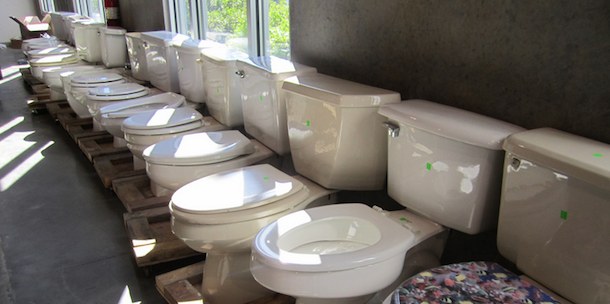Hold The Potty Jokes: World Toilet Day Seeks To Raise Awareness About Need For Basic Sanitation Image courtesy of (catastrophegirl)
The next time you visit your clean, safe commode in the privacy of your own home, take a minute to think about how lucky you are. Seriously. Today is World Toilet Day, and despite the easy potty jokes you could easily summon, a third of the world’s population doesn’t have access to basic, clean sanitation. Never mind that heated seat you love so dearly.
The U.N., Unilever and charity WaterAid issued a joint report today with statistics about just how dire the sanitation situation is for many people, called “We Can’t Wait.” World Toilet Day has been held on Nov. 19 since 2001, and is observed in the hope of increasing awareness about how many people go without the luxury of a clean place to go.
“World Toilet Day is not just about toilet humor, or an attempt to make toilets sexy,” the founders wrote on their website, via CBS News. “World Toilet Day has a serious purpose: it aims to stimulate dialogue about sanitation and break the taboo that still surrounds this issue. In addition, it supports advocacy that highlights the profound impact of the sanitation crisis in a rigorous manner, and seeks to bring to the forefront the health and emotional consequences, as well as the economic impact of inadequate sanitation.”
There are a full 2.5 billion people who can’t do their business on sanitary toilets or latrines, and a billion of those don’t have any facilities at all — just legs to squat with and the wide open world.
Without sanitation, these practices can lead to contaminated drinking water, says the report, which is another huge issue facing much of the world’s population, as it can harm those with autoimmune disease as well as children.
Women can be especially at risk, if they have to go to the bathroom in situations where they could be more vulnerable to sexual attacks, the report says. About 526 million women have to go in the open, and spend 97 billion hours a year just trying to find a safe spot to relieve themselves.
And fewer girls are likely to go to school once they reach puberty if there isn’t a safe toilet. If the school does have sanitary toilets, enrollment among girls goes up 11 percent, says U.N. Secretary-General Ban Ki-Moon Ban
“We must break the taboos and make sanitation for all a global development priority,” he said.
The groups involved in the report suggest governments be held accountable to the promises they make about sanitation access, and called for more education about sanitation and hygiene as part of school curriculum.
“We simply cannot wait. By acting decisively we can now make a positive impact on global health, education, women’s safety, social equality and economic growth for generations to come,” the report authors wrote.
Want more consumer news? Visit our parent organization, Consumer Reports, for the latest on scams, recalls, and other consumer issues.


